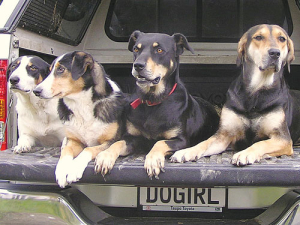NZ Catchment Groups Thrive with ‘Source to Sea’ Approach
The most successful catchment groups in NZ are those that have 'a source to sea' approach.
 Approximately two thirds of Kiwi homes have one or more companion animals such as cats, dogs, or birds.
Approximately two thirds of Kiwi homes have one or more companion animals such as cats, dogs, or birds.
The Ministry for Primary Industries (MPI) has announced that it will lead a national effort to increase the number of New Zealanders trained to care for and handle companion animals during civil defence emergencies.
MPI team leader for animal welfare emergency management Gina Kemp says approximately two thirds of Kiwi homes have one or more companion animals such as cats, dogs, or birds.
“In emergencies, people are often reluctant to evacuate if they are not able to take their pets,” Kemp says. “This can put their lives in danger and those of emergency responders.”
“MPI is partnering with the International Fund for Animal Welfare (IFAW) to deliver 13 two-day training workshops across the country to help grow skills and capacity among councils, government agencies, zoos, wildlife parks and iwi organisations,” she says.
The first workshop is set to be held in Wellington on 13-14 July and is already fully booked.
“Through training provider Fire Rescue and First Response, participants will be taught an NZQA-registered unit standard on providing companion animal welfare during a civil defence emergency,” Kemp says
“A key part of the training will be to teach organisations how to set up temporary animal shelters, such as the facility operated at the Hastings Racecourse to care for companion animals, wildlife, and horses during Cyclone Gabrielle. It’s where we were first introduced to IFAW’s Oceania team who were supporting the shelter’s operations.”
Kemp says that existing shelters and pounds are regularly full.
“These workshops will increase knowledge among people running evacuation centres during civil defence emergencies to handle animals.
“That includes training on preventing injuries and the spread of diseases, such as those that can be transmitted between animals and people.”
IFAW animal rescue programme officer Robert Leach says the partnership with MPI will help reduce barriers to people taking their companion animals to evacuation centres or shelters during emergencies while improving animal welfare outcomes.
“We will share our experience and case studies gained from decades of IFAW leading disaster response efforts across the globe,” Leach says.
“Most recently we helped save pets and wildlife from Ukrainian war zones, wildfires in Greece, and floods in France, and we continually assist authorities and communities around the world to prepare for and respond to disasters.”
MPI has received almost 200 expressions of interest from people and organisations keen to take part in the workshops.
Recent weather events in the Bay of Plenty, Gisborne/Tairawhiti, and Canterbury have been declared a medium-scale adverse event.
DairyNZ's chief executive Campbell Parker says the 2024/25 dairy season reinforces the importance of the dairy sector to New Zealand.
A New Zealand agribusiness helping to turn a long-standing animal welfare and waste issue into a high-value protein stream has won the Australian dairy sector's top innovator award.
OPINION: A bumper season all around.
Dairy Women's Network (DWN) has announced that Taranaki dairy farmer Nicola Bryant will join its Trust Board as an Associate Trustee.
Rural Women New Zealand (RWNZ) says it welcomes the release of a new report into pay equity.

OPINION: A mate of yours truly reckons rural Manawatu families are the latest to suffer under what he calls the…
OPINION: If old Winston Peters thinks building trade relations with new nations, such as India, isn't a necessary investment in…